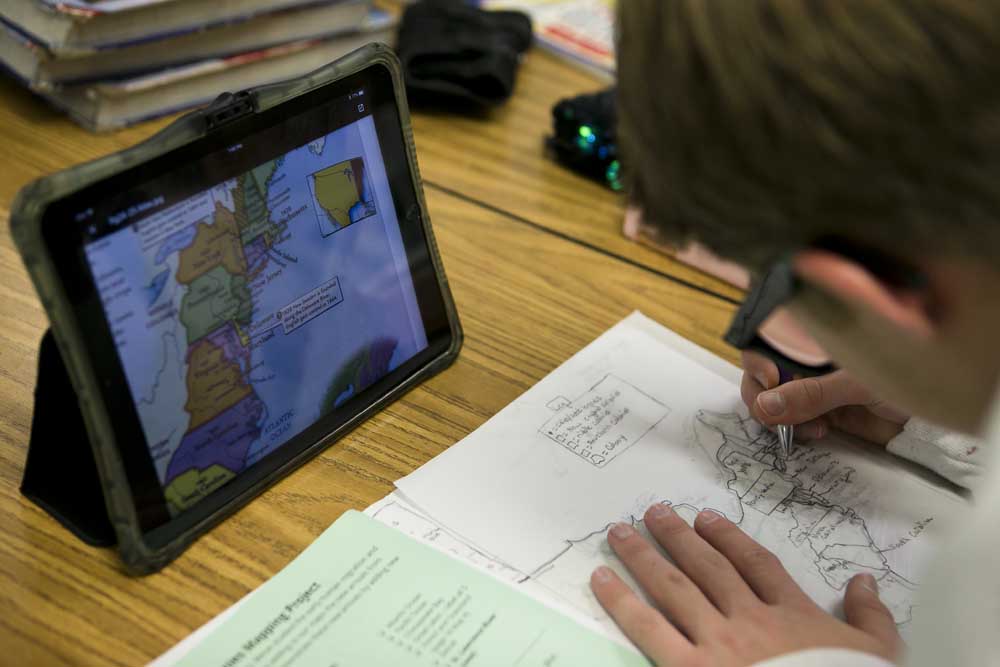Local educators anticipate significant learning loss due to school closures
Published 3:00 pm Saturday, April 25, 2020

- A student uses an iPad to reference a map during an eighth-grade social studies class at Cascade Middle School in Bend on Dec. 6, 2018.
Although Central Oregon’s teachers are teaching remotely as best as they can while schools are closed due to COVID-19, local educators are expecting many students to suffer learning loss during the pandemic.
Many educators fear it could be a worse version of the annual “summer slide,” when lessons fade while students are on vacation.
“Essentially, we’ll have students that will experience, instead of a 10- or 12-week slide … no in-depth learning for six months,” said Lora Nordquist, Bend-La Pine Schools’ future interim superintendent and current assistant superintendent. “That’s a negative impact.”
“Every district across the country that has closed schools is concerned about that, and certainly we are as well,” added Linda Seeberg, executive director of academic achievement for the Redmond School District. “At the very least, the beginning of next (school) year will look different.”
Earlier this month, Portland-based education non-profit group Northwest Evaluation Association Research conducted a study — first reported by The Oregonian — that suggested that the “summer slide” could be even stronger this year, as students will miss in-person classes for at least six months. The effect, which the group dubbed the “COVID-19 Slide,” means students might only retain 70% of new reading knowledge and 50% of new math knowledge if they’re back in classes in September, the study estimated.
In Bend-La Pine, school administrators will soon begin discussing strategies for catching students up in the fall, Nordquist said. And this summer, teacher training sessions — which will be held remotely — will focus on fighting learning loss, she said.
Teachers in Redmond schools will adjust both the content of their classes, as well as the pace of learning, to help students this fall, Seeberg said.
Some Central Oregon teachers said an extended time away from school will hurt students’ academic progress.
Amy Sabbadini, a history teacher at Bend High School, said the stress of the pandemic makes it difficult for some students to focus on remote learning. And some students won’t make any effort at all, she said.
“Even when we’re in school, there’s some kids that you beg to engage and do some learning,” Sabbadini said. “Those kids are not choosing to take advantage of what distance learning is offering, so they’re going to slide further.”
Jeff Schiedler, a teacher of science, technology, math, engineering and art at Sisters Middle School, agreed that missing half a year of classes would negatively impact students. But he noted that this was affecting every student, not just a few, and teachers will work hard to get them up to speed.
“The good news will be that everyone will be at the same level when they come back to school in September, in terms of much time has been missed,” Schiedler said. “Every teacher will go from there.”
Shane Steinke, the father of an eighth-grade student at Cascade Middle School in Bend, said he’s tried to supplement his daughter’s education at home to help her keep up. But he knows students will be playing catch-up in the fall, he said.
“They’re coming back from a six-month summer vacation, basically,” he said.
Jessica Blischke, a mother of four elementary students in High Lakes Elementary School in Bend, suggested that schools could try to combat learning loss in younger students by having them do a little homework over the summer — with rewards.
“The public library system has a rewards system for summer time reading,” she said. “(We could have) a rewards system, cut it down to just language arts and math, with an ice cream party or something for people who completed the online program.”
Rachel Schuetz, a senior instructor at Oregon State University-Cascades who leads the elementary education program at the university, agreed that the pandemic makes education challenging for students, teachers and families. But she stressed that all three of those groups should be patient with themselves right now, and prioritize their well-being.
“I think it’s important to focus on our collective mental health, and give ourselves grace when responding to various impacts of the pandemic,” Schuetz said.
Schuetz also believes there are some silver linings to remote learning for students. They’re gaining valuable skills in using technology that could help them in future careers, and they’re developing grit and resilience, she said.
Schuetz had nothing but praise for Central Oregon’s teachers who are adapting to a new educational landscape.
“I think they’re doing an exceptional job,” she said. “Everything I’ve seen, I’ve been really impressed with.”
Rachael Schuetz, who leads OSU-Cascades’ elementary education program, has a few tips for families whose kids are learning at home during the COVID-19 pandemic.
- If possible, set aside a little time each hour for one-on-one, screen-free time between child and adult — she suggested 15 minutes for younger students and 10 minutes for older students. This keeps kids focused and gives them structure, Schuetz said.
- Have younger children help parents/guardians with household chores, from cooking dinner to changing the oil on a car. This makes kids feel like they’re contributing, and teaches them useful adult skills, Schuetz said.
- Be patient and forgiving of yourself. “It’s really realistic to expect that you cannot be a teacher, a parent and an employee all at the same moment,” Schuetz said. “Understand that we can not be everything at once.”






